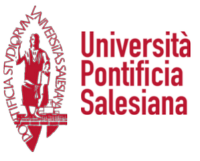Il presente testo, scritto da Carlos Maria Viglietti, racconta alcuni avvenimenti accaduti negli ultimi quattro anni di vita di Don Bosco.
Il presente testo, scritto da Carlos Maria Viglietti, racconta alcuni avvenimenti accaduti negli ultimi quattro anni di vita di Don Bosco.
Il presente testo è nato dalle riflessioni scaturite durante il Simposio sulla “Vita di Domenico Savio” (libro scritto da Don Bosco), organizzato dall’Istituto di Spiritualità della Facoltà di Teologia dell’Università Pontificia Salesiana, in occasione del cinquantesimo anniversario della canonizzazione di San Domenico Savio (12 giugno 1954). L’incontro ha offerto l’occasione per riflettere, attraverso il ritratto biografico del Santo adolescente, sul modello di santità proposto da don Bosco agli adolescenti e ai giovani.
Continue reading “Aldo Giraudo – Domenico Savio raccontato da Don Bosco. Riflessioni sulla vita”
Il cardinale Ballestrero, noto per la solidità degli interventi magisteriali (omelie, predicazioni di esercizi spirituali, discorsi diversi), non scriveva i suoi testi: i suoi discorsi erano frutto di una previa meditazione interiore, una vera e propria ruminatio, dalla quale scaturiva un discorso fecondo e profondo. Il presente studio si fonda, dunque, su alcune trascrizioni fatte da registrazioni dal vivo: la lettera pastorale al clero della diocesi di Torino San Giovanni Bosco, sacerdote di Cristo e della Chiesa (1988); due omelie fatte in Maria Ausiliatrice il 31 gennaio 1988 e 1989; un corso di esercizi spirituali agli Ispettori Salesiani del 1987: Don Bosco prete per i giovani. Continue reading “Paolo Ripa di Meana – Un “bel tipo di padre”. Don Bosco nella predicazione del card. Anastasio Ballestrero”
Lo studio ha lo scopo di delineare la forma di santità che emerge nei processi di beatificazione e canonizzazione di san Giovanni Bosco attraverso un’ermeneutica teologica delle deposizioni fatte dai testimoni. Con l’espressione forma di santità si intende mettere inevidenza due elementi strettamente uniti: la natura della santità cristiana (la sua identità teologale) e la sua espressione del tutto originale nel vissuto del singolo santo. La santità è l’incontro riuscito tra l’infinita novità di Dio e la libertà di un soggetto storico che si apre alla forza rinnovatrice dell’evento pasquale e accetta di diventare un “uomo nuovo”. Continue reading “Andrea Bozzolo – La “forma di santità” di don Bosco. Lettura teologica delle deposizioni nei processi di beatificazione e canonizzazione”
Lo studio affronta un aspetto poco indagato, nelle implicanze teologico-spirituali del carisma di don Bosco, che è l’intreccio continuo tra l’esperienza di orfanezza e quella di paternità nella storia del santo, così come viene restituita dalle autografe “Memorie dell’Oratorio”, per individuarne alcuni spunti teologico-spirituali. Continue reading “Stefano Mazzer – «Tu non hai più padre». Orfanezza e paternità nell’esperienza spirituale di don Bosco a partire dalle “Memorie dell’Oratorio di san Francesco di Sales””
G IO VAN N I Bosco, santo. – Stando ai propri ricordi personali G. nacque
il 15 ag. 1815, festa religiosa dell’Assunta e perciò beneaugurante secondo la mentalità ecclesiastica; stando ai registri parrocchiali di Castelnuovo d’Asti (dal 1930 Castelnuovo Don Bosco) nacque dalle seconde nozze di Francesco con Margherita Occhiena il 16 agosto, festa di s. Rocco, ugualmente propizio secondo la mentalità contadina, e fu battezzato il giorno successivo con i nomi di Giovanni Melchiorre.
Periodo di riferimento: 1815 – 1999
P. Stella, «Giovanni Bosco, Santo», in «Treccani» (2014), 1-13.
Istituzione di riferimento:
Università Pontificia Salesiana
Il contenuto di questo libretto si articola in tre parti:
– linee essenziali della vita di Don Bosco
– sintesi del suo pensiero pedagogico e spirituale
– documenti significativi del sistema preventivo
Continue reading “Biagio Amata – S. Giovanni Bosco. Una vita per i giovani”
In questo libro sono presenti episodi della vita di Don Bosco che generalmente non trovano riscontro nelle biografie correnti.
Continue reading “Pietro Brocardo – Don Bosco ti ricordiamo. Confidenze inedite”
Piccole vicende, a un certo punto del tutto ovvie, hanno portato don Bosco a fermarsi a Torino, prete proveniente dalla campagna, perfettamente acclimatato col mondo della città. Erano stati ardui, al paese, i primi passi segnati dalle concrete difficoltà di studiare e seguire la vocazione ecclesiastica. Decisiva fu la scelta operata alla fine della sua formazione clericale, nel 1844. In teoria avrebbe potuto optare di nuovo per l’universo di origine, ritornare alle « radici » familiari, ambientali, culturali, come semplice potenziale « curato di campagna ». Ma in pratica le esperienze degli anni 1841-1844 lo avevano già preorientato in una certa direzione: l’occuparsi di ragazzi con particolari problemi morali e religiosi, diversi da quelli finora incontrati nelle sue terre e nella cittadina della sua formazione studentesca e seminaristica, la quieta Chieri, tradizionale, quasi « monacale ».
I contributi raccolti in questo quaderno hanno lo scopo di dialogare con le lettrici e i lettori per avviare una riflessione, in prospettiva attualizzante, sulle caratteristiche fondamentali del modello pastorale sottostante all’espressione scelta da don Bosco come motto per sé e per la sua famiglia: “da mihi animas, cetera tolle”. La parola “anime” rimandava alle persone concrete e al loro bisogno di salvezza globale, ai ragazzi poveri e abbandonati, ai giovani e ai ceti popolari. Don Bosco dava una costante e vivace attenzione nei confronti dei giovani per preservare e salvare, per correggere e purificare, per promuovere e potenziare, per rallegrare e istruire, per condurre alla perfezione dell’umano e alla santità.
Joe Boenzi, professore di Teologia e di Spiritualità presso la Dominican School of Philosophy and Theology di Berkeley (California), presenta il significato del motto «Da mihi animas, cetera tolle» nelle scelte di vita e nello stile pastorale di san Francesco di Sales.
Aldo Giraudo cerca di sondare il senso attribuito da don Bosco al programma di «salvezza della anime» racchiuso nel motto e ne indica alcune particolarità spirituali e operative.
Contents:
Continue reading “Egidio Viganò – Saint John Bosco: “Iuventutis pater et magister””
Proudly powered by WordPress | Theme: Baskerville 2 by Anders Noren.